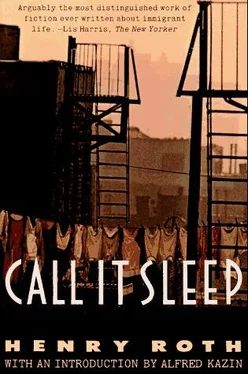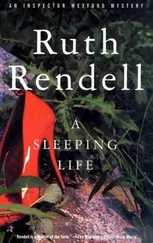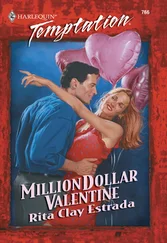The sidewalks were level again.
Luter liked herring, don’t like Luter. Luter likes herring, don’t like Luter. Luter likes — would he be there to-night? He said maybe. Maybe he wasn’t coming. Wish he never comes. Never comes, never comes. Wishee, wishee, never comes, all on a Monday morning — How far was it still?
Eagerly, he scanned the streets ahead of him. Which one was it. Which? Which one was — Long street. Long street, lot of wooden houses. On this side. Yes. Go through the other side. Then other corner … Right away, right away. Be home right away … This one?… Didn’t look like … Next one bet … Giddyap, giddyap, giddyap.… One little house … two little house … three little house … Corner coming, corner coming, corner — Here?
— Here? This one? Yes. Looked different. No. Same one. Wooden houses. Yes.
He turned the corner, hastened toward the opposite one.
— Same one. But looked a little teenchy weenchy bit different. Same one though.
But at the end of the block, uncertainty would not be dispelled. Though he conned every house on either side of the crossing, no single landmark stirred his memory. They were all alike — wooden houses and narrow sidewalks to his right and left. A shiver of dismay ran through him.
— Thought this—? No. Maybe went two. Then, when he ran. Wasn’t looking and went two. Next one. That would be it. Find it now. Mama is waiting. Next one. Quick. And then turn. That was. He’d see. Has to be.
He broke into a tired jog.
— Yes, the next one. That big yellow house on the corner. He’d see it. He’d see it. Yea! How he’d holler when he saw it. There it is! There’s my street! But if — if it wasn’t there. Must be! Must be!
He ran faster, sensing beside him the soft pad of easy-loping fear. That next corner would be haven or bay, and as he neared it, he burst into the anguished spring of a flagging quarry—
— Where? Where was it?
His eyes, veering in every direction, implored the stubborn street for an answer it would not yield. And suddenly terror pounced.
“Mama!” The desolate wail split from his lips. “Mama!” The aloof houses rebuffed his woe. “Mama!” his voice trailed off in anguished abandonment. And as if they had been waiting for a signal, the streets through his tear-blurred sight began stealthily to wheel. He could feel them turning under his feet, though never a house changed place — backward to forward, side to side — a sly, inexorable carousel.
“Mama! Mama!” he whimpered, running blindly through a street now bleak and vast as nightmare.
A man turned the corner ahead of him and walked briskly away on clicking heels. For a tense, delirious instant, he seemed no other than his own father; he was as tall. But then the film snapped open. It was someone else. His coat was greyer, he swung his arms and he walked erect. His father always hunched forward, arms bound to his side.
But with the last of his waning strength, he spurted after him. Maybe he would know. Maybe he could tell him.
“Mister!” he gasped for breath, “Mister!”
The man slackened his pace and glanced over his shoulder. At the sight of the pursuing David, he stopped and turned about in quizzical surprise. Under a long, heavy nose, he had a pointed mustache, the waxed blonde of horn.
“What’s the matter, sonny,” he asked in loud good humor. “What’re you up to?”
“I’m losted.” David sobbed.
“Oh!” He chuckled sympathetically. “Losted, eh? And where do you live?”
“On a hunnder ’n’ twenny six Boddeh Stritt,” he answered tremulously.
“Where?” he bent his ear down, puzzled. “What Street?”
“On Boddeh Stritt.”
“Bodder Street?” He screwed a tip of his mustache to a tighter pitch and regarded David with an oblique, critical eye. “Bodder Street. Can’t say that I’ve ever — Oh! Heh! Heh!” He exploded good-natured again. “You mean Potter Street. Heh! Heh! Bodder Street!”
“Boddeh Stritt,” David reiterated weakly.
“Yea!” he said decisively. “Now listen to me.” He took David’s shoulder. “See that street there?” He pointed to the way David had come. “That one. Now see the street after it — a little further away? That’s two. Now you go one street, two streets, but—” and his finger threatened—“don’t stop there. Go another one. See? Another one.”
David nodded dubiously.
“Yea!” he said reassuringly. “And as soon as you’re there, ask anybody where one twenty six is. They’ll tell you. All right?” he asked heartily, giving David a slight nudge in the desired direction.
Not too reassured but braced with a little more hope than before, David set out, urging rebellious legs into a plodding trot. He was a big man, that man, he must know. Maybe it was Poddeh Street, like he said. Didn’t sound the same, but maybe it was. Everybody said it different anyhow. His mother said Boddeh Stritt, like that. But she couldn’t talk English. So his father told her Boddeh Street, like that. And now the man said Poddeh Street. Puh. Puh. Poddeh. Buh. Buh. Boddeh. Corner is coming … One corner. Gutter is coming … One gutter.
Next and next, he said. Ooh, if he could only see that yellow house on the corner! Ooh, how he’d run! There was a dog in it with long white hair and he ran after a rubber ball. Here, Jack! Here, Jack! Grrrrrh! In his mouth. Everybody knew him. Everybody knew Boddeh Stritt. There was a grocery store in it and a candy store in it and a barber shop. The barber had a big mustache like that man’s, only black. And a big awning on the store. He wasn’t Jewish. In the window, he had another barber, only he wasn’t real and he had a bottle in his hand and his other fingers were like that — round. And he looked at you with the bottle in his hand wherever you went. Walk this way, that way, and he watched — Corner already. Gutter already.
Next and ask. Next and ask. Ooh, if he saw it. Ooh!
“Ooh, mama!” he prayed aloud. “I’m ascared to look, ooh mama, make it on de nex’ one!”
But look he did. The moment he had reached it — up and down, as far as the eye could see: Again a street as alien as any he had ever passed, and like the others, with squat, monotonous flanks receding into vacancy, slack with risen shadow. He didn’t cry out; he didn’t sob. A moment longer he stared. All hope collapsed within him, fell, jarring in his heart. With stiff, tranced body, he groped blindly toward the vague outline of a railing before a basement, and leaning his brow against the cold iron wept in anguish too great to bear. Only the sharp rush of his breath sheared the silence.
Minutes passed. He felt he would soon lose his grip of the iron uprights. At length, he heard behind him slow footsteps that drawing near, scuffed shortly to a halt. What good was looking up? What good was doing anything? He was locked in nightmare, and no one would ever wake him again.
“Here! Here!” A woman’s crisp, almost piqued voice sounded above him, followed the next moment by prim tap on the shoulder. “Young man!”
David paid no heed.
“Do you hear me?” the voice gathered severity. “What is it?” And now the hand began forcing him away from the railing.
He turned about, head rolling in misery.
“Gracious me!” She raised a fending hand. “Whatever in the world has happened?”
Quivering, he looked at her, unable to answer. She was old, dwarfish, yet curiously compact. She wore green. A dark green hat skimmed high over a crest of white hair. From her hand hung a small black shopping bag, only vaguely bulging.
“Gracious!” she repeated, startled into scolding, “Won’t you answer?”
“I–I’m losted,” he sobbed, finding his breath at last. “Aaa! I’m losted.”
Читать дальше












